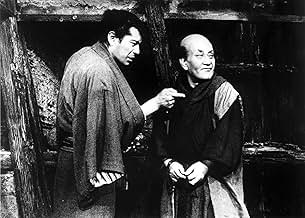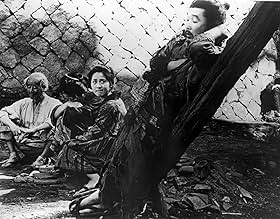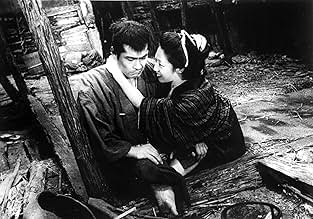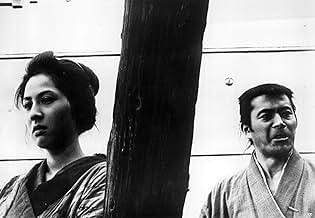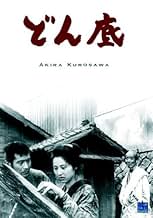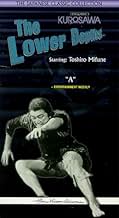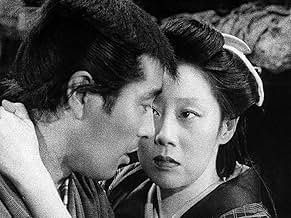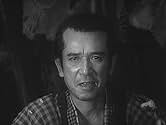ÉVALUATION IMDb
7,2/10
6,3 k
MA NOTE
Ajouter une intrigue dans votre langueIn a Japanese slum, various residents play out their lives, dreaming of better things or settling for their lot. Among them is a man who pines for a young woman but is stymied by her decepti... Tout lireIn a Japanese slum, various residents play out their lives, dreaming of better things or settling for their lot. Among them is a man who pines for a young woman but is stymied by her deceptive family.In a Japanese slum, various residents play out their lives, dreaming of better things or settling for their lot. Among them is a man who pines for a young woman but is stymied by her deceptive family.
- Director
- Writers
- Stars
- Prix
- 5 victoires au total
Kamayuki Tsubono
- Tradesman
- (uncredited)
Avis en vedette
The Criterion Collection offers two different film versions of "The Lower Depths": one made in 1936 by Jean Renoir and another one made in 1957 by Kurosawa. The two directors never worked together on either film. In fact, they only met once in their lives, many years later. Both films are based on Russian writer Maxim Gorky's 1902 play, which describes life in a miserable slum where most characters have lost all sense of hope. Renoir deals with this serious subject matter in a much more humorous and amusing way than Kurosawa, whose film is slower, decidedly somber and a lot more difficult to digest. While Renoir's work takes the viewer in and out of the slums, Kurosawa doesn't allow one to see beyond the wretchedness of the underworld. Both films are great, but it was probably Kurosawa's which left a more durable and deeper impression on me.
10davidals
LOWER DEPTHS perhaps isn't the place to start if you're completely unfamiliar with Kurosawa - but it still ranks as one of his great films, and definitely one of his most underrated.
Based on a Maxim Gorky play (an earlier Jean Renoir film draws upon the same source material), LOWER DEPTHS seems a bit stagey at first, but Kurosawa manages to enliven it considerably - the performances are all top-notch, and the combination of skillful editing (straight cuts only here, but the usual Kurosawa multi-camera shooting method) and inventive set design (with diagonals and angles trapping characters, heighetning the intensity of the dialogue and acting) making this an unforgettable film to watch - easily as accomplished as the better known THRONE OF BLOOD from a little earlier. One will definitely note how tightly constructed - in all ways - this film is.
This film does (along with IKIRU, RED BEARD and HIGH & LOW) illuminate some of Kurosawa's underlying philosophies, specifically a sense of social realism in cinema that can cast a critical gaze upon injustice, and in this film a sense of anger and frustration is articulated with an unusual degree of eloquence, testament to both Kurosawa's technical virtuosity, and his greater awareness of the world.
But for all of the cruelty on display here, there's an equal amount of humor, typically irreverent and loaded with sly social commentary, but also spontaneous: the two impromptu musical episodes, which blend Japanese theatrical conventions with a Chaplin-like sense of visual choreography to very striking effect.
Not as well known as SEVEN SAMURAI, THRONE OF BLOOD or YOJIMBO, but just as accomplished - filled with delight and insight.
Based on a Maxim Gorky play (an earlier Jean Renoir film draws upon the same source material), LOWER DEPTHS seems a bit stagey at first, but Kurosawa manages to enliven it considerably - the performances are all top-notch, and the combination of skillful editing (straight cuts only here, but the usual Kurosawa multi-camera shooting method) and inventive set design (with diagonals and angles trapping characters, heighetning the intensity of the dialogue and acting) making this an unforgettable film to watch - easily as accomplished as the better known THRONE OF BLOOD from a little earlier. One will definitely note how tightly constructed - in all ways - this film is.
This film does (along with IKIRU, RED BEARD and HIGH & LOW) illuminate some of Kurosawa's underlying philosophies, specifically a sense of social realism in cinema that can cast a critical gaze upon injustice, and in this film a sense of anger and frustration is articulated with an unusual degree of eloquence, testament to both Kurosawa's technical virtuosity, and his greater awareness of the world.
But for all of the cruelty on display here, there's an equal amount of humor, typically irreverent and loaded with sly social commentary, but also spontaneous: the two impromptu musical episodes, which blend Japanese theatrical conventions with a Chaplin-like sense of visual choreography to very striking effect.
Not as well known as SEVEN SAMURAI, THRONE OF BLOOD or YOJIMBO, but just as accomplished - filled with delight and insight.
"Donzoko" does not rank among Akira Kurosawa's finest films, but that doesn't mean it should be dismissed, considering the quality of his body of work.
Not many films have explored the moral decadence of humanity in face of poverty such as "Donzoko". It reminds us of how most humans are, deep down, only worried about themselves and their own worldy pleasures.
The inclusion of the "Old Man" gives the film an almost Buddhist insight into the situation of the slum, which helps painting its extremely intriguing - even if limited - canvas.
7.7/10
Not many films have explored the moral decadence of humanity in face of poverty such as "Donzoko". It reminds us of how most humans are, deep down, only worried about themselves and their own worldy pleasures.
The inclusion of the "Old Man" gives the film an almost Buddhist insight into the situation of the slum, which helps painting its extremely intriguing - even if limited - canvas.
7.7/10
Without it being one of Akira Kurosawa's finest, The Lower Depths is an exceptional film. As with any Kurosawa film it is wonderfully made, with well-crafted sets and fine use of camera work. Kurosawa directs superbly, always with a delicate touch while giving detail and humanity to his stories and characters. And those they do here. The story has a lot of intensity and unsentimental in its telling of lives without hope, and the characters are powerfully written with a lot of humanity. The ensemble playing is really magnificent with the standouts being Toshiro Mifune, charismatic as ever, and Kamatari Fujiwara, who conveys an astonishing range of emotions here. My only real criticism of The Lower Depths is the rather abrupt ending, other than that it is a really well-done film with a lot of things to like about Kurosawa's films present. 9/10 Bethany Cox
This movie is less easily accessible than other movies by Akira Kurosawa. None of the samurai honor, swordfighting action or visual beauty of his more well known efforts, Still, if you give yourself the time to view and appreciate it, it is a strong, involving movie with better staying power than most of what hits the silver screen in a typical season.
Le saviez-vous
- AnecdotesThe entire film was shot mostly in sequence and was finished in about four weeks.
- Citations
Sutekichi the Thief: Lies trump the truth every time.
- ConnexionsFeatured in 62nd Annual Academy Awards (1990)
Meilleurs choix
Connectez-vous pour évaluer et surveiller les recommandations personnalisées
- How long is The Lower Depths?Propulsé par Alexa
Détails
- Durée
- 2h 17m(137 min)
- Couleur
- Mixage
- Rapport de forme
- 1.37 : 1
Contribuer à cette page
Suggérer une modification ou ajouter du contenu manquant

